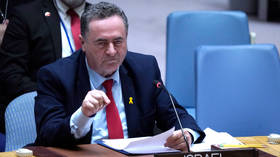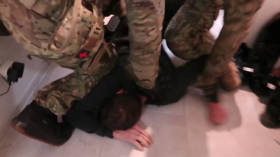Revealing the real names of undercover spycops who ruined lives is the only way they can be held to account

The UK’s Undercover Policing Inquiry has censored mention of the name of an officer who did untold emotional damage to a number of women. This is another injustice for victims who have already suffered enough.
On November 5, Dave Smith was scheduled to make a statement at the Undercover Policing Inquiry (UCPI), on the subject of ‘blacklisting’ – a long-running conspiracy in which big business and UK security agencies identified ‘troublemakers’ in workplaces and secretly barred them from employment.
At the last minute however, Smith’s appearance was cancelled, due to a legal complaint lodged over the content of his speech – namely, his planned mention of the real name of ‘Carlo Neri,’ an undercover officer who’d infiltrated left-wing campaign groups in London between 2001 and 2006, including the Socialist Party.
Also on rt.com ‘Real world’ wives of UK ‘spycops’ seek justice for lives shattered by the undercover police operationUCPI chair John Mitting also censored mention of his identity in a statement relayed to the Inquiry on November 9 by Phillippa Kaufmann QC, on behalf of 21 women deceived into long-term romantic relationships by police spies. Heather Williams QC, who read a statement on behalf of six other inquiry ‘core participants,’ was likewise prevented from naming him.
This suppression is difficult to comprehend given the real name of ‘Neri,’ Carlo Soracchi, has been in the public domain since April 2019, having been disclosed by a journalist on Twitter.
Emotional blackmail
In any event, as a result of extensive work by researchers and activists, those Soracchi spied on – including two women he deceived into long-term relationships – had known his real name for years prior, but chose to keep it confidential for the sake of his family.
As with all undercover officers under investigation by the UCPI, Soracchi lodged an anonymity order in respect of his own name, citing threats to his personal safety in justification, despite acknowledging the many individuals he’d spied on, and various activist groups he’d infiltrated, were committed to non-violence and democratic principles.
UCPI chair John Mitting accepted his application, and appealed to the “humanity” of those individuals who knew his real name to keep the information confidential.
Believing Soracchi to have “waived his anonymity when he chose to manipulate and emotionally and sexually abuse women,” those he deceived into relationships said Mitting’s approach amounted to “emotional blackmail,” and placed them in an “extremely difficult and distressing position.”
Their outrage is echoed by Colin Tate, spokesperson for Campaign Opposing Police Surveillance. He notes that, while revealing the cover names of spycops means those targeted can know which of their friends was an infiltrator, only releasing their real names will mean they can be held to account for their actions.
This is especially relevant, he feels, given that several ‘spycops’, such as Bob Lambert and Andy Coles, have, since their deployments, gone on to enjoy respected, privileged positions in public life that are “outrageously inappropriate for someone with their history of abuses.”
“Yet again, the UCPI is prioritising the convenience and comfort of spycops and their families over the right of those who were abused to know the truth of what was done to them,” Colin says. “Carlo’s real name has been public knowledge for ages. It’s utterly absurd to try to push the toothpaste back in the tube. Many undercovers have had their real names made public and nothing untoward has happened to them. If we don’t grant anonymity to thieves and fraudsters, what right do spycops have?”
Victims of deceit
Donna McLean was one of the women deceived into a relationship by Soracchi, under his ‘Carlo Neri’ pseudonym. Her story was outlined by Phillippa Kaufmann QC at the November 9 UCPI hearing.
Donna expresses “extreme disappointment” at Mitting’s decision, but isn’t overly surprised, believing it to be “yet another example of spycops’ privacy being valued above that of survivors of their abuses.”
“We’re under no illusion that every aspect of the public inquiry is weighted towards the rights of perpetrators rather than their victims,” she explains.
Donna dated Soracchi between 2002 and 2004, the pair meeting at an anti-war demonstration and hitting it off immediately. Within six weeks, Soracchi had moved into her flat, integrating into her life, meeting her family and talking of marriage and children. Frequently though, he’d disappear for brief periods, claiming he was seeing his son from a previous, short-term relationship, in Cornwall.
On New Year’s Eve 2003, in the presence of several of her good friends, he proposed, to which she agreed. Soracchi even rang her mother to tell her the news. He would subsequently accompany Donna on her family holidays, and was by her side at her sister’s graduation. In reality, he already had a wife, who was raising their three-year-old child largely alone. It was, in fact, a prerequisite for undercover officers to be married and have stable homes to return to when their deployments concluded.
Abruptly, the relationship began to deteriorate in September 2003. Over Christmas that year, Soracchi told Donna he was going to Italy as his father was ill. In January, he phoned to say his return would be delayed as his father had died.
He also confided in her there was a history of domestic abuse in his family, that he’d previously suffered from depression and suicidal thoughts, and his sister, with whom he was very close, had been sexually abused by their father.
Also on rt.com UK cops need to realise that calling a jihadi a ‘faith-claimed terrorist’ will neither stop jihadism nor tackle islamophobiaSoracchi’s behaviour grew increasingly volatile and he began distancing himself from her, both emotionally and physically. Donna became convinced he was in the midst of a mental breakdown. In May 2004, Soracchi moved out of Donna’s flat, but their relationship intermittently endured for another six months, until he told her via email he wanted no further contact. Not long after, unbeknownst to her, his real-life second child was born.
She was also unaware that Soracchi’s breakdown was pure theatre, preparation for the end of his deployment, executing his undercover ‘exit strategy.’ Many British police spies precipitated their vanishing from the political movements, friendship circles and romantic relationships in which they’d dishonestly and manipulatively ensconced themselves in this manner.
Reading about that precise pattern of behaviour by other British police spies in the book Undercover in 2013, Donna was struck by the similarities between their disappearances and Soracchi’s own. It wouldn’t be until two years later that her seismic suspicions were confirmed.
Repeat offender
Soracchi had previously employed similar tactics to extract himself from his relationship with ‘Lindsey’ (a pseudonym). The pair met in early 2001 through mutual friends in the Socialist Party, Soracchi having widely perpetuated the outright lie he was unhappily single.
By the autumn of that year, things had got more serious, at Soracchi’s instigation – he told Lindsey he loved her, and surprised her with a holiday to Venice in December. She let her guard down significantly and threw herself into the relationship, introducing him to her family and politically active friends in Liverpool.
Like so many other spycops, Soracchi consciously endeavoured to spin false narratives of his own vulnerability and victimhood in order to deepen their deceptive bond. As with Donna, he mentioned he had a son from a previous relationship, although to Lindsey he claimed they were estranged, and he was agonising over whether to re-establish contact. He enlisted her help in making that decision, swearing her to secrecy.
It was in the early months of 2002 that Soracchi began to withdraw from Lindsey emotionally without explanation, disappearing for days at a time, his phone switched off all along, telling her his mother was ill in Italy and he couldn’t cope with the emotional strain.
Feeling rejected, she ended the relationship in April 2002. Lindsey’s self-esteem and confidence were significantly impacted, and she was left with a sense of painful confusion over the relationship. Some time after they split, Soracchi rang to “confide” in her that his father was seriously ill. Subsequently, she wrote him a letter saying she still loved him.
Like Donna, she learned in 2015 she’d been in a relationship with a man who didn’t exist, and was actually a police spy. Lindsey couldn’t believe it at first, but once the truth was confirmed, she went into a state of shock, suffering sleepless nights, intense embarrassment and much self-doubt, feeling a significant period of her life had been stolen from her due to Soracchi’s deception. She questioned her own judgement, and the motives and authenticity of other past friendships and associations.
Justice denied
Lindsey eventually launched a civil action against police, which is ongoing. The legal processes have necessitated invasive discussions and disclosures with lawyers and others concerning her sexual history, prolonging her agony, and making her revisit and relive some of her most unpleasant, excruciating memories.
Donna also instigated legal action against the police, for the “abusive, cold-hearted, psychological torture” inflicted on her by Soracchi. Launched in January 2016, it is also ongoing, despite officials accepting liability a mere three weeks after she’d initiated it.
Police have yet to disclose any files held on her, offer her a financial settlement, or issue an apology, any and all of which might allow her to move on with her life. Her campaign for justice has effectively become a full-time job, derailing her career in the process.
Also on rt.com Horrific rise in cases of baby abuse is the hidden cost of lockdown that we simply cannot ignoreIn the period between deceiving Lindsey and Donna into romantic relationships, Soracchi was introduced to a woman named Beth, by a mutual friend in the Socialist Party. They dated briefly, before she went to Australia for an extended trip. Upon Beth’s return in 2005, they rekindled their relationship, and Soracchi soon moved in with her. There are indications they’re now married and have a child together.
Mitting’s decision to grant Soracchi anonymity was influenced by a psychiatrist’s appraisal that he suffered from “significant mental health conditions resulting, at least in part, from the effects of the deployment.”
No similar consideration has apparently been paid by the UCPI chair to the psychological impact upon undercover officers’ assorted victims of not being able to know the real identities of the individuals with whom they campaigned, lived, travelled, fell in love and planned futures, over the span of many years.
This disconnect is particularly inexplicable, and egregious, given that so often in courts throughout the country, uniformed officers give evidence in person against violent, dangerous criminals, disclosing their names, the station and area in which they’re deployed, and much more besides.
Moreover, in 2013, former spycop Peter Francis, who for five years infiltrated left-wing political groups, including family justice campaigns, elected to give up his anonymity, disclosing much sensitive information about his deployment, and the officially-sanctioned tactics he employed to deceive and manipulate surveillance targets.
As of November 2020, not a single person he spied on, an incalculable total given the length and extent of his time undercover, has sought retribution in any way.
Think your friends would be interested? Share this story!
The statements, views and opinions expressed in this column are solely those of the author and do not necessarily represent those of RT.














